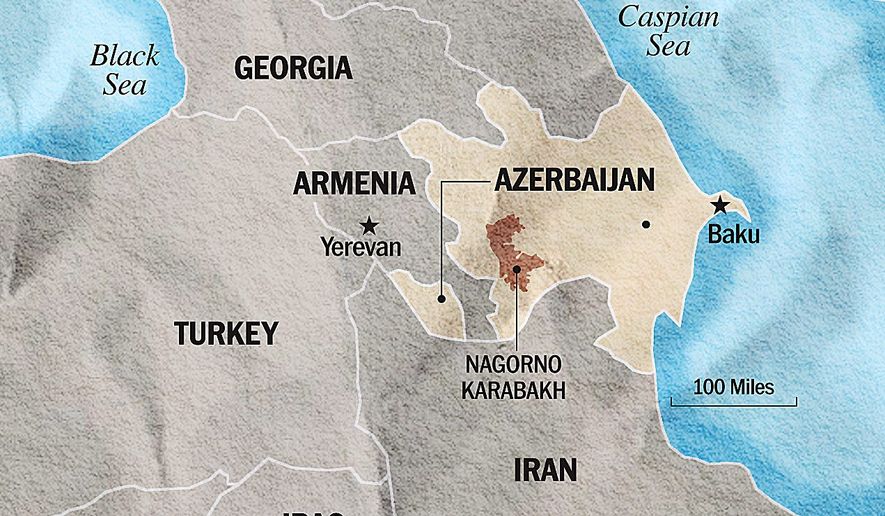OPINION:
When it comes to American foreign aid, it is often the message — rather than the dollar figure — that matters. A textbook case is Nagorno-Karabakh, the internationally recognized Azerbaijani territory, illegally occupied by Armenia.
Armenia suffered a severe blow in May when President Trump’s proposed budget for fiscal 2018 cut assistance to Armenia by nearly 70 percent, from $22.4 million to $6.8 million.
Yet, concurrently, the proposed budget slashed aid to Azerbaijan by 90 percent, down to $1 million. Sweeping foreign aid cuts are a hallmark of the Trump administration and, in theory, should not be “taken personally.” However, through its cuts in Eurasia, the administration loses its moral compass by penalizing Azerbaijan, the victim of a territorial occupation in Nagorno-Karabakh, more than the actual occupier, Armenia.
Looking exclusively at aid to Armenia and Azerbaijan paints a strong picture — but an incomplete one. The real dilemma lies in Nagorno-Karabakh, the site of a decades-long conflict between Yerevan and Baku.
In September, the House adopted an amendment by Rep. David Valadao, California Republican, to support continued congressional funding of the HALO Trust’s demining activity in farmlands and villages in Nagorno-Karabakh. Rep. Jackie Speier, California Democrat, declared that “this modest $1.5 million amendment is destined to have a major impact on the physical and mental health of the people of Artsakh (accurately called Nagorno-Karabakh).”
Indeed, $1.5 million is a relatively “modest” sum within the grand scheme of U.S. foreign aid. But what message is America sending the world through its financial backing for Nagorno-Karabakh?
Here are the key takeaways:
• America funds an occupied, unrecognized territory. The Armenian occupation violates U.N. Security Council Resolutions 853, 874 and 884, as well as U.N. General Assembly Resolutions 19/13 and 57/298, which all describe Nagorno-Karabakh as Azerbaijani territory.
The State Department states that the U.S. “does not recognize Nagorno-Karabakh as an independent country, and its leadership is not recognized internationally or by the United States. The United States supports the territorial integrity of Azerbaijan and holds that the future status of Nagorno-Karabakh is a matter of negotiation between the parties.”
However, true support for the “territorial integrity of Azerbaijan” should entail firm opposition of the Armenian occupation — in the form of defunding Nagorno-Karabakh.
• America supports its lawmakers going rogue. Nagorno-Karabakh receives more than financial backing from the U.S. It also benefits from important symbolic gestures by American lawmakers — such as the recent, unacceptable visit by Reps. Valadao, Frank Pallone, New Jersey Democrat, and Tulsi Gabbard, Hawaii Democrat. By making a diplomatic trip to Armenian-occupied Azerbaijani territory, these legislators are saying that Azerbaijan’s sovereignty means nothing, not to mention violating stated U.S. foreign policy.
If Nagorno-Karabakh continues to receive American financial support, members of Congress will continue to feel entitled to go rogue and visit an unrecognized territory.
• America funds a Russian vassal state. Rep. Adam Schiff, California Democrat, ranking member of the House Permanent Select Committee on Intelligence, is tasked with investigating Russian influence in the U.S. But Mr. Schiff, a vocal supporter of Armenia, would be well served by looking in the mirror and acknowledging Yerevan’s contribution to the problem he is purportedly trying to solve. Armenia is squarely within Russia’s sphere of influence, in a striking modern-day parallel to the former Soviet Union’s Cold War satellites.
Russian President Vladimir Putin has said that “the positions of Armenia and Russia are close to each other or coincide.” Armenian President Serzh Sargsyan affirmed that he coordinates his foreign policy with Russian interests. Yerevan’s Los Angeles consulate emphasizes the goal of “strengthening and deepening the special partnership and allied relationship with Russia.” Not surprisingly, Armenia’s consul general, Sergey Sarkisov, is a Russian oligarch.
The Armenian-Russian entanglement is embodied not just by words, but by weapons — and Moscow’s military manipulation of Yerevan shows no signs of abating. Armenia’s borders and airspace are patrolled by Russian troops and aircraft. In February, Russia promised the Armenians a $200 million weapons credit, and introduced a plan to utilize Armenia as a connector for a regional power grid extending to Iran. Yuri Khachaturov, an Armenian general, was appointed to lead the Collective Security Treaty Organization — commonly known as “Putin’s NATO.” This development is particularly concerning for the U.S., given Russian placement of nuclear-capable Iskander ballistic missiles alongside America’s NATO Baltic allies.
Armenia is Russia’s vassal — its secret ingredient to expanding global power, at the expense of American power. Why, then, should the U.S. embolden Armenia through funding the occupation of Nagorno-Karabakh?
When it comes to foreign aid for Armenia and Nagorno-Karabakh, America needs a new plan — a policy that is both fiscally and morally sensible.
America should fund real allies — not occupied, unrecognized territories like Nagorno-Karabakh. Further, the U.S. should send the Russians a strong message by rejecting the illegal actions of their vassal, Armenia.
Defunding Nagorno-Karabakh might not make a substantial difference in the total price tag of U.S. foreign aid. But the message would have significant reverberations for this country’s standing in the world — that when it comes to American spending, practicality and morality still matter.
• Jacob Kamaras is an editor for the Jewish News Service.




Please read our comment policy before commenting.